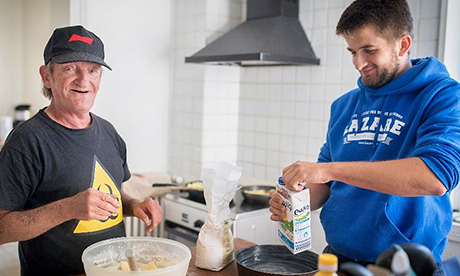The French Catholic Church is much diminished. Yet French Catholicism remains a powerful creative force.
The Lazarus Association is one expression of its continuing inventiveness. The organization is pioneering a new approach to homelessness that has transformed the lives of hundreds of people, won papal approval, and spread across Europe.
It began in 2006, when two young Frenchmen — Étienne Villemain and Martin Choutet — felt called to help the homeless in Paris.
“They both had the desire to establish a genuine bond with others ‘on an equal footing,’ to live poverty with simplicity and to live out this ‘mission’ prayerfully,” Sibylle de Malet, the association’s international manager, told The Pillar.
A Catholic parish lent the two men an apartment, and they moved in with four men with precarious housing situations: Yves, Karim, Rabah, and Valery.
The arrangement was unsurprisingly challenging at times. One day, Étienne Villemain — who would later inspire Pope Francis to establish the World Day of the Poor — returned from work to find Karim brandishing a gun. He knew that Karim came from a violent background: as a youngster, he witnessed his father strangling his two-year-old sister and then taking his own life. He had grown up in shelters and struggled to express his feelings.
Karim soon reassured Villemain that the gun was plastic. “But I have a question for you,” he said, “who pays you to live with me?”
“Karim didn’t know friendship, this free and loving relation with others, which was the source of his human reconstruction,” commented Malet. “That’s how our adventure started.”
The transformation of Fred
Out of that experiment was born the idea of an organization that would bring together homeless people and young professionals to live under one roof.
The Lazarus Association was formally established in France in 2011. Some 250 people are currently living in its shared apartments in 16 cities in France, Belgium, Spain, Switzerland, and Mexico.
Each home is single-sex and accommodates between six and 10 people, known in French as “colocs” (housemates).
“Half of our residents have been homeless or experienced socio-economic insecurity, and the other half are young working adults who volunteer with the organization,” Malet explained.
“Everyone has their own bedroom and a stable standard of shared living where privacy and freedom of choice are respected. The living room, kitchen, and bathroom are shared. We treat all our housemates equally – housework is divided fairly, and everyone pays the same affordable rent.”
In purely statistical terms, shared homes are remarkably successful:
- 85% of homeless people go on to find a permanent place to live;
- 46% find employment or training; and 9
- 5% say they are either happy or very happy living with young professionals.
Malet cites the example of a man named Fred who was homeless for five years. Continue reading
Additional readingNews category: Analysis and Comment, Great reads.




